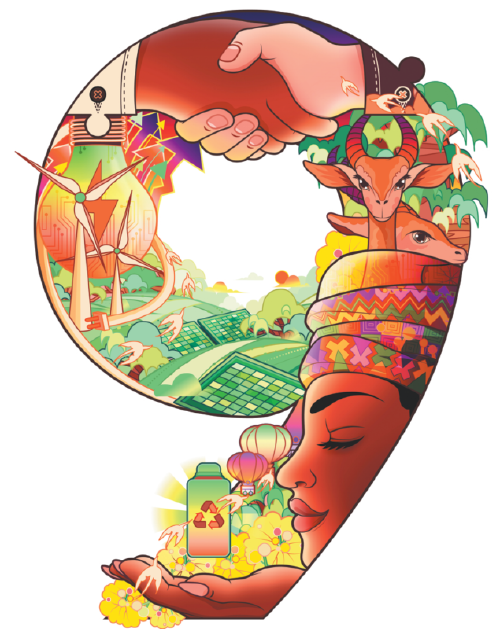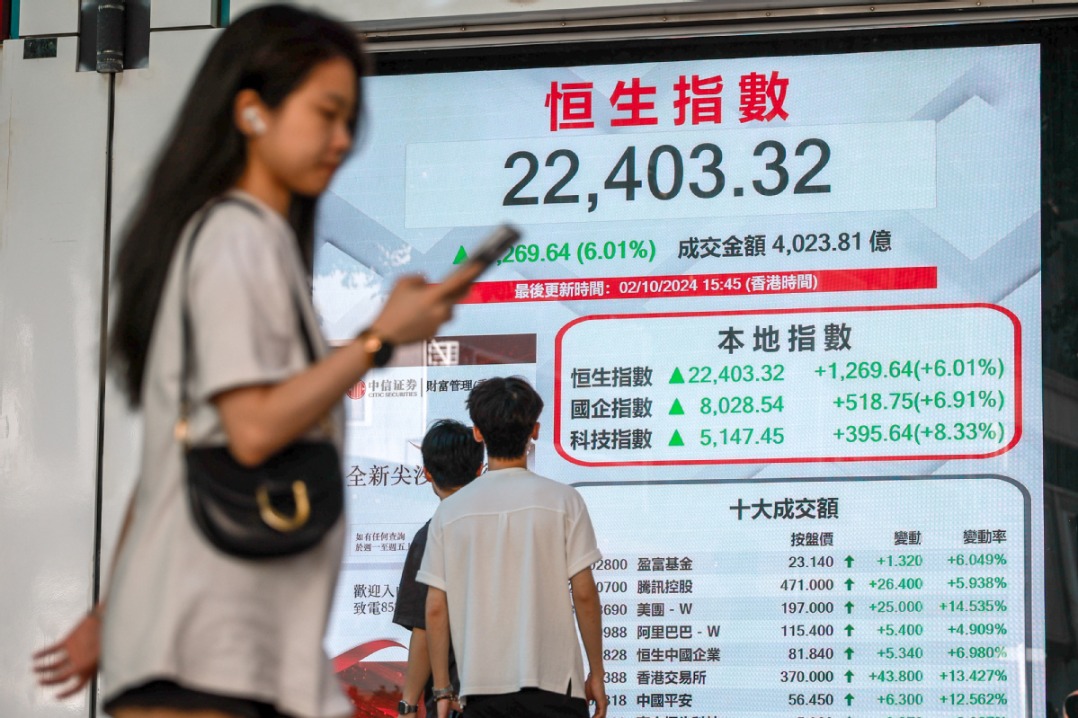Where China, Africa can go next


The partnership should focus on modernizing the continent's agriculture and using the experience to create job opportunities
In January 2024, a shipload of containers left South Africa with goods bound for African ports. South Africa became the 31st country trading under the African Continental Free Trade Area since its launch in 2021. So far 47 countries have ratified the agreement.
The increasing intra-African trade creates value chains, the essence of development. It is happening now thanks to Africa's growing infrastructure — roads, railroads, ports and power grids. The infrastructure built by China through the Belt and Road Initiative is a historic "win" for Africa.
In the process, China has gained access to commodities and minerals as well as markets for consumer goods targeting Africa's growing middle class. Taken together, the inbound and outbound flows on Africa's new infrastructure are helping fuel the rise of China as a modern industrial giant and a global economic power — a major "win "for China.
China and African countries have both won by focusing almost single-mindedly on infrastructure. They have weathered years of criticism depicting the infrastructure projects as "debt traps", "thinly-veiled colonization" and, of course, "African gullibility and Chinese deviousness".
Still, there are glaring deficits in infrastructure on the continent. Therefore, the China-Africa partnership should stay the course and build more roads, ports, power stations and railroads. Infrastructure will be the number one priority for at least another generation.
What should be the second, third or fourth priority for the partnership during that generation? In 2024, the Forum on China and Africa Cooperation might consider the following areas as priorities.
The leading contender for second priority for the partnership is food insecurity.
Perennial dependence on food aid undermines all aspects of any country. Inability to produce or buy enough food is the Achilles' Heel of many African countries. It hobbles modernization and opens African countries to interference and manipulation. Yet some African countries have swathes of land that can produce enough food to meet local demand with excess for export. In some African countries, food aid now distorts prices and discourages local production, thereby making more food aid necessary.
In our time, climate change is aggravating food insecurity as time-tested hardy crops of the African Savanna are becoming a distant memory. Unless major and perhaps radical steps are taken, climate change will deepen and widen food insecurity, leading to unprecedented social crises.
Just three generations ago, analysts painted a similar grim picture about China, warning of an impending nightmare caused by food insecurity. Yet, China has successfully lifted millions of people out of extreme poverty, by, among other things, producing enough food for the population.
Many African policymakers and analysts desperately want to replicate China's success. Thus, the China-Africa partnership should focus on modernizing African agriculture and food production to help Africa avert what could be a calamity for the continent.
The third priority is employment, especially for Africa's youth.
Africa's youth can be seen as an ally in the drive for modernization, a huge actual or potential market for consumer goods, a wellspring of creativity or a receptive window through which to redesign African values. But in country after country, a high proportion of college and technical training school graduates are finding no opportunities to better their lives. These dashed hopes pose a threat that is probably as grave as food insecurity in some African countries.
The extraction of commodities and minerals out of Africa creates employment opportunities and a skilled workforce. But more value addition — production of finished goods in Africa — to create thousands of meaningful opportunities is urgently needed.
This is precisely what has happened thanks to the partnerships between China and the Association of Southeast Asian Nations members. Chinese companies have created more than 660,000 jobs in total (2022) in Singapore, Indonesia, Malaysia, Thailand and Vietnam and other ASEAN countries. A similar pool of jobs is urgently needed in Africa.
With suitable arrangements such as those in ASEAN countries, some of the 10,000 Chinese companies that have gained experience in Africa could be encouraged to undertake local manufacturing to create employment and build a skilled and technical workforce. Like ASEAN, Africa wants to become a small manufacturing hub for the world.
The fourth priority area is the transition from fossil fuels.
They do not have a monopoly but African countries hold significant quantities of commodities and minerals such as rare earth metals, which are playing a central part in the transition away from fossil fuels as a source of energy. With the exception of South Africa, these minerals are sent outside Africa for processing to produce goods, some of which are sold back to Africa.
It would be a catastrophe if within two or three generations Africa sold and exhausted its minerals and commodities, leaving a legacy of roads, railroads and ports. Africa will have missed its opportunity to modernize. To avoid this outcome, the natural resources that are facilitating the transition away from fossil fuels must be increasingly processed and used in the manufacture of finished products in Africa. This leapfrogging to make and use products for a post-fossil fuel era must become the new measure of development and modernization for African countries.
For example, the experience that Chinese companies have gained in South Africa can be used to manufacture electric vehicles, solar panels, wind turbines and storage, or create wind farms in eastern Africa given the availability of minerals, rare earth metals and oil in the subregion. The assembly of electric vehicles in Kenya by Associated Vehicle Assemblers in a joint venture with Chinese car manufacturer BYD can be replicated elsewhere.
China has shown a willingness to listen to and support African aspirations and agency. In return, Africa has supported China's priorities. In this spirit, in 2024, the Forum on China and Africa Cooperation can assess the suitability of focusing on the transition from fossil fuels, manufacturing to create meaningful opportunities especially for Africa's young population, and banishing food insecurity as priorities for the next generation without downgrading infrastructure. If any of the three areas are deemed to be suitable additions to infrastructure, then clear targets should also be established to guide the China-Africa partnership for a generation and beyond.
The author is a former economist with the World Bank and advisor for the Kenyan government. The author contributed this article to China Watch, a think tank powered by China Daily. The views do not necessarily reflect those of China Daily.
Contact the editor at editor@chinawatch.cn.
































